七年级英语时态汇总一般现在时一般过去时和现在进行时
- 格式:doc
- 大小:121.00 KB
- 文档页数:21
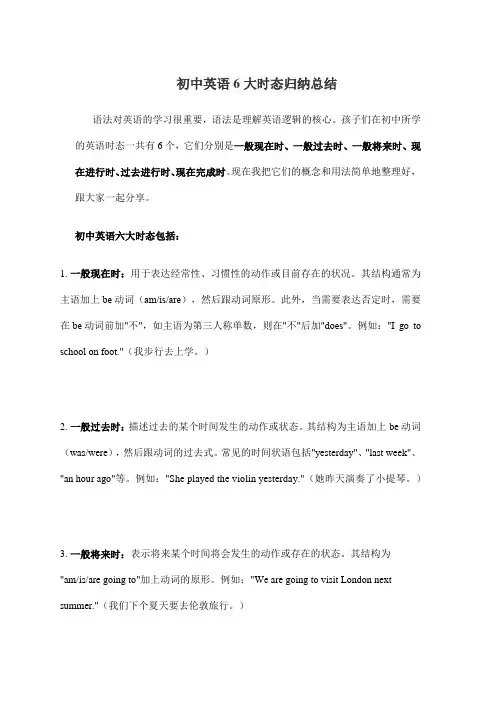
初中英语6大时态归纳总结语法对英语的学习很重要,语法是理解英语逻辑的核心。
孩子们在初中所学的英语时态一共有6个,它们分别是一般现在时、一般过去时、一般将来时、现在进行时、过去进行时、现在完成时。
现在我把它们的概念和用法简单地整理好,跟大家一起分享。
初中英语六大时态包括:1.一般现在时:用于表达经常性、习惯性的动作或目前存在的状况。
其结构通常为主语加上be动词(am/is/are),然后跟动词原形。
此外,当需要表达否定时,需要在be动词前加"不",如主语为第三人称单数,则在"不"后加"does"。
例如:"I go to school on foot."(我步行去上学。
)2.一般过去时:描述过去的某个时间发生的动作或状态。
其结构为主语加上be动词(was/were),然后跟动词的过去式。
常见的时间状语包括"yesterday"、"last week"、"an hour ago"等。
例如:"She played the violin yesterday."(她昨天演奏了小提琴。
)3.一般将来时:表示将来某个时间将会发生的动作或存在的状态。
其结构为"am/is/are going to"加上动词的原形。
例如:"We are going to visit London next summer."(我们下个夏天要去伦敦旅行。
)4.现在进行时:表示现阶段或说话时正在进行的动作及行为。
其结构为主语加上助动词"be"(am/are/is)加上动词的-ing形式。
例如:"She is listening to music."(她在听音乐。
)5.过去进行时:主要用来表示过去某一时刻或一段时间正在进行的动作或者存在的状态。
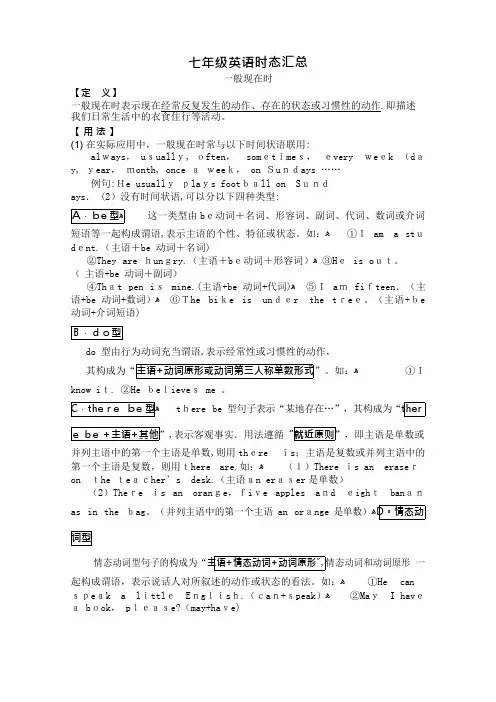
七年级英语时态汇总一般现在时【定义】一般现在时表示现在经常反复发生的动作、存在的状态或习惯性的动作.即描述我们日常生活中的衣食住行等活动。
【用法】(1) 在实际应用中,一般现在时常与以下时间状语联用:always, usually, often, sometimes,every week (day, year,month, once aweek, on Sundays ……例句:He usuallyplays football on Sundays. (2)没有时间状语,可以分以下四种类型:A.be 型ﻫ这一类型由be动词+名词、形容词、副词、代词、数词或介词短语等一起构成谓语,表示主语的个性、特征或状态。
如:ﻫ①Iam a student.(主语+be 动词+名词)②They are hungry.(主语+be动词+形容词)ﻫ③He is out。
(主语+be 动词+副词)④That pen ismine.(主语+be 动词+代词)ﻫ⑤I am fifteen.(主语+be 动词+数词)ﻫ⑥The bike is under the tree。
(主语+be 动词+介词短语)B.do型do 型由行为动词充当谓语,表示经常性或习惯性的动作,其构成为“主语+动词原形或动词第三人称单数形式”。
如:ﻫ①Iknow it. ②He believes me 。
C.there be 型ﻫthere be 型句子表示“某地存在…”,其构成为“ther e be+主语+其他”,表示客观事实.用法遵循“就近原则”,即主语是单数或并列主语中的第一个主语是单数,则用there is;主语是复数或并列主语中的第一个主语是复数,则用there are.如:ﻫ(1)There is an eraseron the teacher’s desk.(主语an eraser 是单数)(2)There is an orange,five apples and eightbananas in the bag。

初一英语时态总结一、一般现在时态(Simple Present Tense)1. 表示经常性或习惯性的动作、状态或真理。
例句:I often go to school by bus.(我经常坐公交车去学校。
) Water boils at 100 degrees Celsius.(水在100摄氏度时沸腾。
)2. 表示客观事实、科学真理或普遍规律。
例句:The sun rises in the east.(太阳从东方升起。
)Water freezes at 0 degrees Celsius.(水在0摄氏度时结冰。
) 3. 表示主语的特性或个人喜好。
例句:She likes playing basketball.(她喜欢打篮球。
)He is a smart boy.(他是个聪明的男孩。
)二、一般过去时态(Simple Past Tense)1. 表示过去某个时间发生的动作或状态。
例句:I went to the park yesterday.(我昨天去了公园。
) They lived in China when they were young.(他们年轻时住在中国。
)2. 表示过去的习惯或经常性动作。
例句:We used to play soccer every weekend.(我们过去每个周末都踢足球。
)She always studied until late at night.(她过去总是学习到很晚。
)3. 表示过去的真理或规律。
例句:Dinosaurs existed millions of years ago.(恐龙存在于几百万年前。
)The Earth was flat according to ancient beliefs.(根据古代的信仰,地球是平的。
)三、一般将来时态(Simple Future Tense)1. 表示将来某个时间或在某个时间之后发生的动作或状态。
例句:I will visit my grandparents next week.(下周我会去看望我的祖父母。
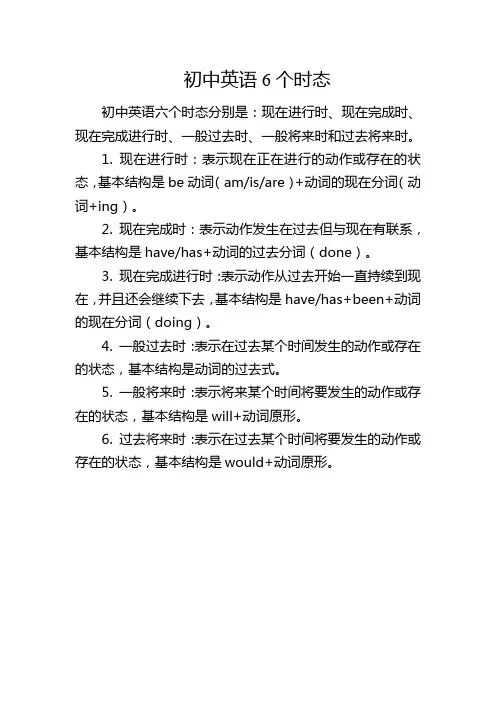
初中英语6个时态
初中英语六个时态分别是:现在进行时、现在完成时、现在完成进行时、一般过去时、一般将来时和过去将来时。
1. 现在进行时:表示现在正在进行的动作或存在的状态,基本结构是be动词(am/is/are)+动词的现在分词(动词+ing)。
2. 现在完成时:表示动作发生在过去但与现在有联系,基本结构是have/has+动词的过去分词(done)。
3. 现在完成进行时:表示动作从过去开始一直持续到现在,并且还会继续下去,基本结构是have/has+been+动词的现在分词(doing)。
4. 一般过去时:表示在过去某个时间发生的动作或存在的状态,基本结构是动词的过去式。
5. 一般将来时:表示将来某个时间将要发生的动作或存在的状态,基本结构是will+动词原形。
6. 过去将来时:表示在过去某个时间将要发生的动作或存在的状态,基本结构是would+动词原形。
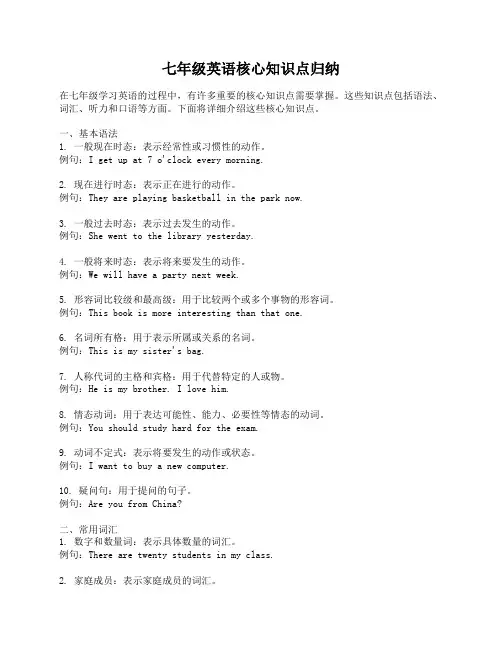
七年级英语核心知识点归纳在七年级学习英语的过程中,有许多重要的核心知识点需要掌握。
这些知识点包括语法、词汇、听力和口语等方面。
下面将详细介绍这些核心知识点。
一、基本语法1. 一般现在时态:表示经常性或习惯性的动作。
例句:I get up at 7 o'clock every morning.2. 现在进行时态:表示正在进行的动作。
例句:They are playing basketball in the park now.3. 一般过去时态:表示过去发生的动作。
例句:She went to the library yesterday.4. 一般将来时态:表示将来要发生的动作。
例句:We will have a party next week.5. 形容词比较级和最高级:用于比较两个或多个事物的形容词。
例句:This book is more interesting than that one.6. 名词所有格:用于表示所属或关系的名词。
例句:This is my sister's bag.7. 人称代词的主格和宾格:用于代替特定的人或物。
例句:He is my brother. I love him.8. 情态动词:用于表达可能性、能力、必要性等情态的动词。
例句:You should study hard for the exam.9. 动词不定式:表示将要发生的动作或状态。
例句:I want to buy a new computer.10. 疑问句:用于提问的句子。
例句:Are you from China?二、常用词汇1. 数字和数量词:表示具体数量的词汇。
例句:There are twenty students in my class.2. 家庭成员:表示家庭成员的词汇。
例句:My father is a doctor. My mother is a teacher.3. 介词短语:用于表示方向、位置等的短语。
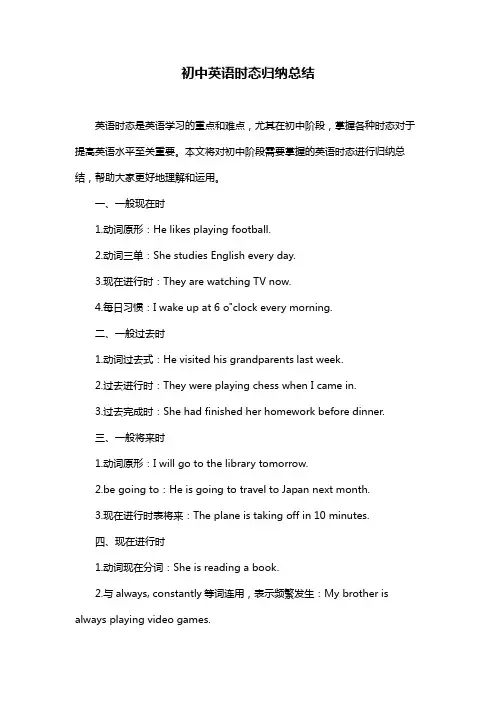
初中英语时态归纳总结英语时态是英语学习的重点和难点,尤其在初中阶段,掌握各种时态对于提高英语水平至关重要。
本文将对初中阶段需要掌握的英语时态进行归纳总结,帮助大家更好地理解和运用。
一、一般现在时1.动词原形:He likes playing football.2.动词三单:She studies English every day.3.现在进行时:They are watching TV now.4.每日习惯:I wake up at 6 o"clock every morning.二、一般过去时1.动词过去式:He visited his grandparents last week.2.过去进行时:They were playing chess when I came in.3.过去完成时:She had finished her homework before dinner.三、一般将来时1.动词原形:I will go to the library tomorrow.2.be going to:He is going to travel to Japan next month.3.现在进行时表将来:The plane is taking off in 10 minutes.四、现在进行时1.动词现在分词:She is reading a book.2.与always, constantly等词连用,表示频繁发生:My brother is always playing video games.五、过去进行时1.动词过去分词:They were discussing the project.2.与at that time, at this moment等词连用,表示在某个时间正在进行的动作:At that time, she was sleeping.六、完成时1.现在完成时:I have finished my homework.2.过去完成时:He had left the classroom before I arrived.七、被动语态1.一般现在时:The book is written by him.2.一般过去时:The window was broken by Tom.3.一般将来时:The letter will be sent to her tomorrow.总结:初中英语时态的学习需要掌握一般现在时、一般过去时、一般将来时、现在进行时、过去进行时、完成时和被动语态等。

初一时态与语态详解英语学习中,时态和语态是非常重要的概念。
初一阶段的学生常常面临对时态和语态的混淆和困惑。
本文将详细解释初一阶段需要掌握的时态和语态相关知识,帮助学生们更好地理解和运用。
一、时态1. 一般现在时态(Simple Present)一般现在时态用于描述经常性或普遍性的动作、习惯或真理。
例如:I play basketball every day. (我每天打篮球。
)2. 现在进行时态(Present Continuous)现在进行时态表示现在正在进行的动作。
例如:She is studying in the library. (她正在图书馆学习。
)3. 一般过去时态(Simple Past)一般过去时态用于描述过去发生的动作或状态。
例如:He watched a movie yesterday. (他昨天看电影了。
)4. 过去进行时态(Past Continuous)过去进行时态表示过去某个时刻正在进行的动作。
例如:I was reading a book at that time. (那时我正在读书。
)5. 一般将来时态(Simple Future)一般将来时态用于描述将来会发生的动作或事件。
例如:They will visit their grandparents next week. (下周他们将会拜访他们的祖父母。
)6. 现在完成时态(Present Perfect)现在完成时态表示过去发生的动作对现在产生的影响或结果。
例如:She has washed the dishes. (她洗过了碗。
)7. 过去完成时态(Past Perfect)过去完成时态用于描述过去某个时间之前已经发生的动作。
例如:I had finished my homework before he arrived. (他到达之前我已经完成了我的作业。
)8. 将来完成时态(Future Perfect)将来完成时态表示将来某个时间之前将会完成的动作。
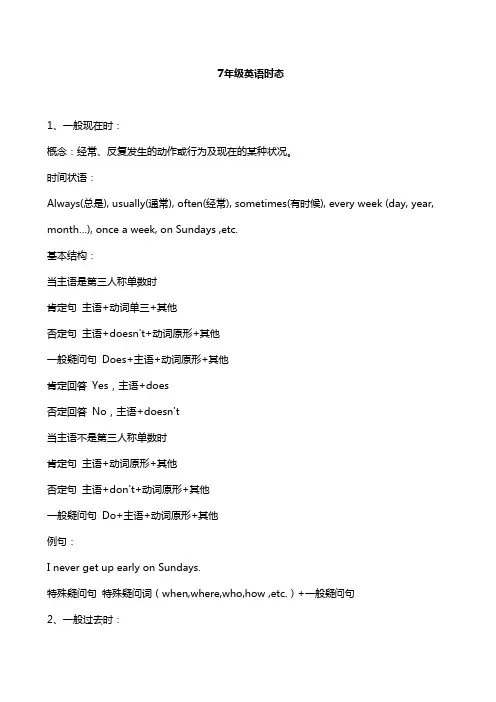
7年级英语时态1、一般现在时:概念:经常、反复发生的动作或行为及现在的某种状况。
时间状语:Always(总是), usually(通常), often(经常), sometimes(有时候), every week (day, year, month…), once a week, on Sundays ,etc.基本结构:当主语是第三人称单数时肯定句主语+动词单三+其他否定句主语+doesn't+动词原形+其他一般疑问句Does+主语+动词原形+其他肯定回答Yes,主语+does否定回答No,主语+doesn't当主语不是第三人称单数时肯定句主语+动词原形+其他否定句主语+don't+动词原形+其他一般疑问句Do+主语+动词原形+其他例句:I never get up early on Sundays.特殊疑问句特殊疑问词(when,where,who,how ,etc.)+一般疑问句2、一般过去时:概念:过去某个时间里发生的动作或状态;过去习惯性、经常性的动作、行为。
时间状语:ago, yesterday, the day before yesterday, last week(year, night, month…), in 1989, just now, at the age of 5, one day, long long ago, once upon a time, etc.基本结构:主语+动词过去式+其他否定形式did+not+do+其他;一般疑问句did+主语+do+其他?例句:I went to Italy .I visited museums and sat in public gardens3、现在进行时:概念:表示现阶段或说话时正在进行的动作及行为。
时间状语:now, at this time(在这一刻), these days, etc.基本结构:am/is/are+doing否定形式:am/is/are+not+doing.一般疑问句:把be动词放于句首。
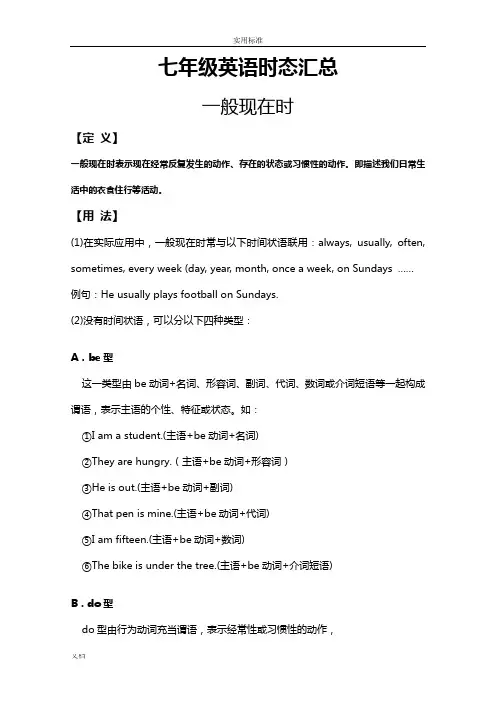
七年级英语时态汇总一般现在时【定义】一般现在时表示现在经常反复发生的动作、存在的状态或习惯性的动作。
即描述我们日常生活中的衣食住行等活动。
【用法】(1)在实际应用中,一般现在时常与以下时间状语联用:always, usually, often, sometimes, every week (day, year, month, once a week, on Sundays ……例句:He usually plays football on Sundays.(2)没有时间状语,可以分以下四种类型:A.be型这一类型由be动词+名词、形容词、副词、代词、数词或介词短语等一起构成谓语,表示主语的个性、特征或状态。
如:①I am a student.(主语+be动词+名词)②They are hungry.(主语+be动词+形容词)③He is out.(主语+be动词+副词)④That pen is mine.(主语+be动词+代词)⑤I am fifteen.(主语+be动词+数词)⑥The bike is under the tree.(主语+be动词+介词短语)B.do型do型由行为动词充当谓语,表示经常性或习惯性的动作,【结构】主语+动词原形+宾语即某人+某个动词+其他。
如果有,只要在be动词或情态动词后面加上not。
如果句子中没有be动词(is, am 或者are)或情态动词(can)那么根据主语在后面加入don’t(you, I或者复数)【口诀】当主语是第三人称单数时肯定句主语+动词三单+其他否定句主语+doesn't+动词原形+其他一般疑问句Does+主语+动词原形+其他肯定回答Yes,主语+does否定回答No,主语+doesn't特殊疑问句特殊疑问词+一般疑问句当主语不是第三人称单数时肯定句主语+动词原形+其他否定句主语+don't+动词原形+其他一般疑问句Do+主语+动词原形+其他用错结构全句都错,一定要注意。
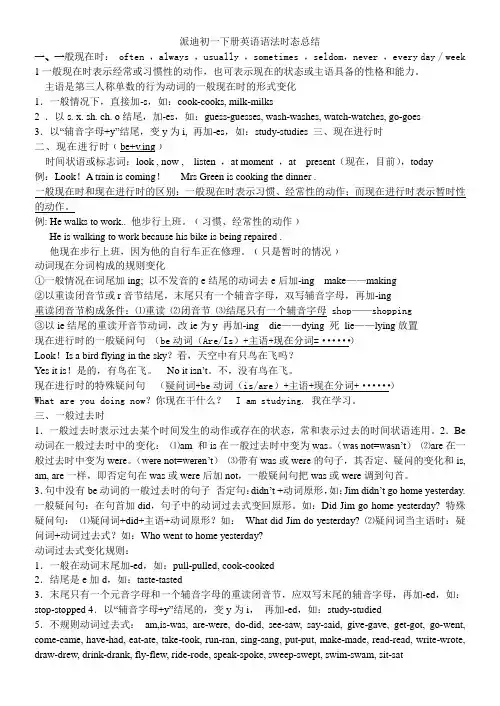
派迪初一下册英语语法时态总结一、一般现在时: often ,always ,usually ,sometimes ,seldom,never ,every day / week 1一般现在时表示经常或习惯性的动作,也可表示现在的状态或主语具备的性格和能力。
主语是第三人称单数的行为动词的一般现在时的形式变化1.一般情况下,直接加-s,如:cook-cooks, milk-milks2 .以s. x. sh. ch. o结尾,加-es,如:guess-guesses, wash-washes, watch-watches, go-goes3.以“辅音字母+y”结尾,变y为i, 再加-es,如:study-studies 三、现在进行时二、现在进行时﹙be+v.ing﹚时间状语或标志词:look , now , listen ,at moment ,at present(现在,目前),today例:Look!A train is coming!Mrs Green is cooking the dinner .一般现在时和现在进行时的区别:一般现在时表示习惯、经常性的动作;而现在进行时表示暂时性的动作。
例: He walks to work.. 他步行上班。
﹙习惯、经常性的动作﹚He is walking to work because his bike is being repaired .他现在步行上班,因为他的自行车正在修理。
﹙只是暂时的情况﹚动词现在分词构成的规则变化①一般情况在词尾加ing; 以不发音的e结尾的动词去e后加-ing make——making②以重读闭音节或r音节结尾,末尾只有一个辅音字母,双写辅音字母,再加-ing重读闭音节构成条件:⑴重读⑵闭音节⑶结尾只有一个辅音字母 shop——shopping③以ie结尾的重读开音节动词,改ie为y 再加-ing die——dying 死lie——lying放置现在进行时的一般疑问句(be动词(Are/Is)+主语+现在分词=······)Look!Is a bird flying in the sky?看,天空中有只鸟在飞吗?Yes it is!是的,有鸟在飞。
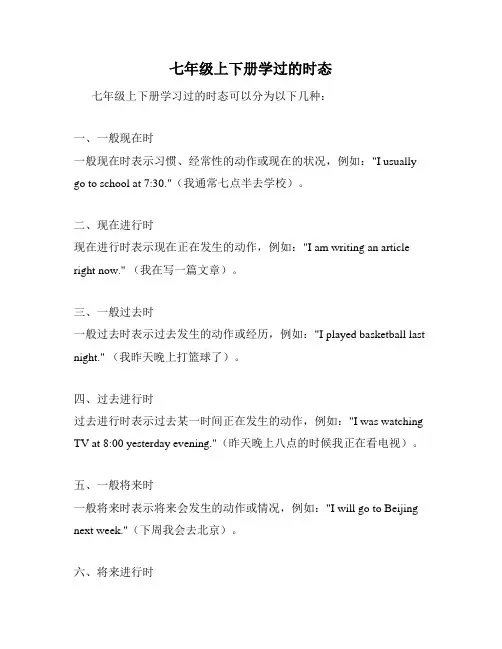
七年级上下册学过的时态七年级上下册学习过的时态可以分为以下几种:一、一般现在时一般现在时表示习惯、经常性的动作或现在的状况,例如:"I usually go to school at 7:30."(我通常七点半去学校)。
二、现在进行时现在进行时表示现在正在发生的动作,例如:"I am writing an article right now." (我在写一篇文章)。
三、一般过去时一般过去时表示过去发生的动作或经历,例如:"I played basketball last night." (我昨天晚上打篮球了)。
四、过去进行时过去进行时表示过去某一时间正在发生的动作,例如:"I was watching TV at 8:00 yesterday evening."(昨天晚上八点的时候我正在看电视)。
五、一般将来时一般将来时表示将来会发生的动作或情况,例如:"I will go to Beijing next week."(下周我会去北京)。
六、将来进行时将来进行时表示将来某一时间正在发生的动作,例如:"This time next week, I will be studying for the final exam."(下周这个时间,我会在为期末考试而学习)。
七、现在完成时现在完成时表示过去发生的动作对当前有影响或仍在持续,例如:"I have studied English for 3 years."(我学了三年英语了)。
八、过去完成时过去完成时表示过去某一时间之前已经发生的动作,例如:"I had finished my homework before my parents came back."(在我父母回来之前,我已经完成了作业)。
英语时态汇总一般现在时定义一般现在时表示现在经常反复发生的动作、存在的状态或习惯性的动作..即描述我们日常生活中的衣食住行等活动..用法(1)在实际应用中;一般现在时常与以下时间状语联用:always; usually; often; sometimes; seldom; never;every week day; year; month; once a week; on Sundays ……例句:He usually plays football on Sundays.2没有时间状语;可以分以下四种类型:这一类型由be动词+名词、形容词、副词、代词、数词或介词短语等一起构成谓语;表示主语的个性、特征或状态..这时I 用am.. you;we;they 复数用 are ..he; she ;it ;单数用is如:①I am a student.主语+be动词+名词②They are hungry.主语+be动词+形容词③He is out.主语+be动词+副词④That pen is mine.主语+be动词+代词do型由行为动词充当谓语;表示经常性或习惯性的动作;其构成:主语是: I;you;we.they;复数肯定句:I;you;we.they;复数+动词原形+其它否定句:I;you;we.they;复数+don’t+动词原形+其它一般疑问句:Do +主语+动词原形+其它肯定回答:Yes; 主语+do. 否定回答:No; 主语+ don’t.主语是: he; she; it ;单数肯定句:He; she; it ;单数+动词第三人称单数形式+其它否定句:He; she; it ;单数+doesn’t +动词原形+其它一般疑问句:Does+ he; she; it ;单数+动词原形+其它肯定回答:Yes; 主语+does. 否定回答:No; 主语+ doesn’t.there be型句子表示“某地存在…”;;表示客观事实..用法遵循;即主语是单数或并列主语中的第一个主语是单数;则用there is;主语是复数或并列主语中的第一个主语是复数;则用there are..如:1There is an eraser on the teacher's desk.主语an eraser是单数 2There is an orange;five apples and eight bananas in the bag.并列主语中的第一个主语an orange是单数;情态动词和动词原形一起构成谓语;表示说话人对所叙述的动作或状态的看法..如:①He can speak a little English.can+speak②May I have a book; pleasemay+have练习一、用所给词的适当形式填空..Be动词1. Jim __________be a hard-working student at school.2. __________be Tom and Sam in the same class3. Your school life __________be very interesting.4. There __________be a pen; two rulers and some books on the desk.5. The boys __________be very friendly to me.6. Maria __________be not from the7. __________be there any trees and a pool in the yard8. I want to __________be a teacher.9. Mr. Wang can’t __________be at home; because the lights areoff.10. Don’t __________be late for school again.二、用所给词的适当形式填空..情态动词1. My mom can __________cook food well.2. Must she __________stay at home now3. What can the boy __________do for his parents4. Tom can’t __________sing an English song.5. He may __________perform ballet at Kangkang’s birthday party.6. She should __________help her parents do some housework.三、用所给词的适当形式填空..实义动词1. Tom often __________take a talk after supper.2. Tom and I usually __________go to school by bike.3. Does Lin Tao __________like reading storybooks4. What classes do you __________have today5. How often does the girl __________watch TV6. Where do they __________live now7. Every year many people __________lose their lives in trafficaccidents.8. Sam doesn’t __________get up early in the morning.9. Each of them __________have a nice schoolbag.10. They each __________sleep late at night.四、句型转换..Be动词1. She is in a blue dress.变否定句She __________ __________ a blue dress.2. I am from Qijiang.变一般疑问句__________ __________ from Qijiang3. Are the storybooks very interesting否定回答No; __________ __________.4. His parents are both workers.变一般疑问句__________ his parents __________ workers5. There are some nice books on the shelf.对划线部分提问__________ __________ on the shelf五、句型转换..情态动词1. My mother may speak a little English.变否定句My mother __________ __________ speak a little English.2. We should be careful when we cross the street.变一般疑问句__________ __________ be careful when we cross the street3. Must I finish my homework at once作肯定和否定回答Yes; __________ __________.No; __________ __________.4. Tom can recite a Chinese poem.对划线部分提问What __________ Tom __________六、句型转换..实义动词1. They often play the piano loudly.变否定句They __________ often __________ the piano louldy.2. Jim learns English well.变一般疑问__________ Jim __________ English well3. She likes Sichuan food very much.对划线部分提问What __________ she __________ very much4. Do the boys usually play football after school作肯定回答 Yes;________ ;__________.5. She usually does some cooking in the evening.变否定句She usually __________ __________ any cooking in the evening.6. I want to do some shopping.变一般疑问句__________ you __________ to do any shopping7. Tom often wathes TV at night.对划线部分提问What __________ Tom often __________ at night8. They sometimes go swimming in the afternoon.对划线部分提问What __________ they sometimes __________ in the evening现在正在进行时定义现在正在进行时表示说话的瞬间正在进行或发生的事情..标志词:now; look; listen;right now;at the/this moment;at+钟点结构主语+ beam / is / are+动词的-ing形式..首先分析划线部分的意思;确定用哪个疑问词what; where; who; when; which; whose; how; how many; how much; what shape; whatcolour; what … doing; where … going; what … do;然后再将原句变为一般疑问句形式即将be动词提到主语之前;其余的不变..如:What time is Tom readingread an interesting story book Where are they takingtake pictures现在正在进行时常与一些固定的时间短语搭配使用:①now“现在”如: Jim is playing soccer now.②Look Listen “看啊听啊”如:Look Mr. on the computer.right now= at the moment“此刻”如:trees at the momnet.③Where is…问题的回答;暗指说话的时候..如:—Where is your mom; Tom—④前面早就阐明是现在的短文中..练习一、用所给词的适当形式填空..1. My parents ____________watchTV now.2. Look. Three boys ___________run.3. What _______ your mother ___________donow4. _______ your dog ___________ nowsleep5. _______ you ___________listento music Yes; I am.6. Look; Miss Chen ___________ football.play7. Tom and his sister ___________waitfor you over there.8. Now Class 3 and Class 4___________havea test.9. Listen; someone ___________singin the classroom.10. ——Where is Zhang Yan——She ___________talkwith her teacher in the teacher’s office.11. The boy ___________ _____________ drawa picture now.12. Listen .Some girls __________ ____________ singin the classroom .13. My mother __________________ cut some bread now.14. What _________ you __________ do now15. Look. They __________________ have an English lesson .16. They __________ _________not ;play basketball now.17.Look the girls __________ _____________dance in the classroom .18.What is our grandmother doing She _______________watch TV.19. It’s 5 o’clock now. We _________ ___________havesupper now20. The cats run in the garden now.二、句型转换..1. Look Lily is dancing.改为一般疑问句________________________________________________2. Kate is looking for her watch.改为否定句________________________________________________3. Mrs White is watching TV.对划线部分提问________________________________________________4. I am doing homework.改为否定句________________________________________________5. They are waiting for you at the library.就划线部分提问__________________________________________________三、根据中文提示完成句子:1. 小花不是在写作业;她在画画..Xiao Hua ____________ _________ homework. She _________ _________ pictures.2. 今天李老师穿着一件红色的连衣裙..Miss Li _________ _________ a red dress today.3. 你爷爷在看报纸吗_________ your grandpa _________ the newspaper4. Tom和Jim在做什么_________ _________ Tom and Jim _________5. 他们是在打篮球还是在打排球_________ they ________ basketball _________ volleyball一般现在时、现在进行时综合练习一、写出下列动词的三单形式和现在分词三单现在分词三单现在分词三单现在分词三单现在分词buy _______ _______ fly _____ _______ plant ______ _______ study ______ _______drink _____ ______ play_____ _______ go ______ _______ make ______ _______do _______ ______ dance ______ ______ worry ______ _______ ask_______ _______taste _____ ______ eat ___ ___ ___ __ read ______ _ _ put ________ ________let ______ ______ run _______ _______ keep _____ _______ have ______ ________find _____ ______ get ___ ___ ___ _ eat ______ ___ ___ ring _______ ________write_____ _______ sleep _______ _______ give _____ _______ stop ______ _______二. 用正确的动词形式填空1.The children are ___________ run there now.2.-I ________ up at half past six this morning. get-My father always __________come back from work very late.3.Listen Who__________sing in the music room Oh. Mary _______singthere.4.- ______ you _________ have any color pens -Sorry; I don’t haveany.5.She likes eggs; but she __________________ not like bread.6.My mother tell me a story every night.–7.–How much meat ________ you ___________ want - A kilo; please.8.Someone __________ be in the next room.9.There __________ be a pen and two erasers in the pencil- box.10.You must _________ get here at two this afternoon.11.We must __________ help the teacher carry it.12.Who __________ teach you English in your school13.The teacher is busy. He only __________ sleep five hours a day.14.Look The bus ____________________ come.15.She _____ go to school from Monday to Friday.16.What _______ he _________ like17.He __________ teach English in a middle school.18.You always do your homework well.19.– What ________ she ___________ do-She _________ ______________ clean her room now.20.Look at the man. He __________________ drink tea.21.He can ___________ sing this song.22.Let’s ___________ help my mother ___________ cook.23.I think Li Lei must ______________ be at school.24.There __________ be some bread and meat on the table.25.Listen She __________ sing an English song.26.Liu Ying _______________ study in Beijing these days.27.They _____________________ clean the floor now.28.Look He ___________________ drink tea.29.Han Meimei often ____________ play games after school.30.What __________ the girls __________ do over there now31._______ your sister ________ know English41.Where _______ your pen pal ______ come from42.The boy is ___________ watch TV at home.43. Su Hai ______ have eight lessons this term.45.___________ be you sitting and drinking tea46.One of the people __________ be singing.47.What are they doing They _____________ clean the room.49.Look Lucy ____________ fly a kite with Lily.50.I can ___________ speak Chinese and English.51.How _________ you _________ do52.She ____________ look like her mother.53.I ___________ not think so.54.My friends _____________ play cards now.55.Listen Who _____________ sing in the classroom56.Jim ___________ have a good friend.57.Where ___________ do your friend come from60.She ___________ live in the city.62.Class One _________ have a map of China.63.Mr Green ___________ teach them English every day.64.The little girl __________ have a round face.67.The music __________ sound very great.68.She _______________ not like opera.69.Tom often _____________ sing Japanese songs.70.Jack and I often __________ swim in the river.71. What ______ she _______ do at weekends72. My cousin walk to school every day.74. They ____________ not/water the flowers now.75. —______ Helen ____________ wash clothes —Yes; she is.78. -What day _____ be it today -It’s Saturday.79.. My father always __________come back from work very late.80. Where __________ you __________ have lunch every day82.What are you _________do now I ___________eat bread.73. It’s nine o’clock. My father_______________work in the office.84. Look; the boy______________put the rubbish into the bin.85. ____________he____________clean the classroom No; he isn’t. He____________play.86. Where is Mak He___________run on the grass.三. 句型转换3. The twins go to school on foot every day. 同上_________ the twins _______ to school on foot every day5. She is going to shopping tomorrow. 变否定句_____________________________6. My mother likes her students. 变一般疑问句____________________ 13. Mary usually plays games with her grandparents.否定句:Mary usually _______ ________ games with her grandparents.一般疑问句:______ Mary usually ________ games with her grandparents 特殊疑问句: Mary usually14. They are doing their homework.否定句:They ______ ________ their homework.一般疑问句:______ they ________ their homework特殊疑问句:______ ______ they _______15. Mary does her homework well.否定句:Mary her homework well.一般疑问句:Mary her homework well16. I sometimes write to my mother in the evening.用tonight改写句子I to my mother tonight.四、单句改错1.Does he enjoys listening to music2.The boy has a party at home now.3.He spends much time reading book last weekend.4.Linda can helps his mother clean the room.5.Someone are looking at you.一般过去时定义一般过去时表示过去某个时间发生过了的动作或存在过的状态..即描述已经发生过了的事情..时间标志性词yesterday;the day before yesterday; in 2010; three days ago; last night; month; year; weekend; just now; 另一般过去时也表示经常或反复发生的动作;常和often; always等表示频率的时间状语连用..例如:I always went to school on foot last year. 去年我通常走路去上学..用法这一类型由be动词was和were+名词、形容词、副词、代词、数词或介词短语等一起构成谓语;表示主语以前或过去的个性、特征或状态..如:was a student ten years ago.主语+be动词+名词were hungry just now.主语+be动词+形容词was under the tree yesterday.主语+be动词+介词短语④It was rainy last Sunday.very happy at Kangkang’s birthday party.did型由行为动词过去式充当谓语;表示以前做过的某事;其构成为“主语+动词过去式动词”..如:①him when I was young me at that time .there be型句子表示“某地曾经存在…”;其构成为“there bewas/were+主语+其他”..用法遵循“就近原则”;情态动词型句子的构成为“主语+情态动词过去式could+动词原形”;情态动词过去式和动词原形一起构成谓语;表示主语过去或曾经能做的事情..如:①He could speak a little English last year.could+speak②What could she do when he was ten.练习一、用所给词的适当形式填空..Be动词1. I __________be a little girl at that time.2. When __________be you born3. Maria __________be born in Cuba.4. The weather yesterday __________be very cold.5. They __________be very happy at Kangkang’s birthday partyyesterday.6. What __________be the date the day before yesterday7. __________be you at home a moment ago8. Where __________be your parents last Saturday9. My mother __________be not in Chongqing last month.10. How __________be the weather this morning二、用所给词的适当形式填空..情态动词1. Jane __________can speak Chinese well when she was only five.2. __________can they dance the disco last year3. I __________can not sleep well last night.4. What __________can you do just now三、用所给词的适当形式填空..实义动词1. I __________like reading books before. But now I don’t.2. She __________watch TV late yesterday evening.3. We __________clean up our classroom a moment ago.4. __________ they __________have any bread this morning5. What __________ you __________do the day before yesterday6. Tom __________go to visit the Great Wall last year.7. Mr. Wang __________sing an English song just now.8. __________ Lin Tao have a good time at the party last Sunday9. We __________not porform ballet yesterday. We __________recitea poem.10. The wind yesterday __________blow strongly.四、句型转换..Be动词1. I was born in a small town.变为一般疑问句__________ you __________ in a small town2. Sam was a little boy at that time.变为否定句Sam __________ __________ little boy at that time.3. His friends were in the library just now.对划线部分提问__________ __________ his friends just now4. Were they very happy yesterday作否定回答No; __________ __________.5. Was your brother born in Chongqing作肯定回答Yes; __________ __________.五、句型转换..情态动词1. I could sing English songs when I was five.变一般疑问句__________ you __________ English songs when you were five2. The boy could ride a bike last year.变否定句The boy __________ __________ a bike last year.3. They could play a game yesterday.对划线部分提问What __________ they __________ yesterday4. Could your friends cook food last Sunday作肯定回答Yes; __________ __________.六、句型转换..实义动词1. I went to Sichuan with my friends during summer holidays.变否定句I __________ __________ to Sichuan with my friends during summer holidays.2. She recited a poem at Kangkang’s birthday party.变一般疑问句__________ she __________ a poem at Kangkang’s birthday party 3. They did their homework half an hour ago.变否定句They __________ __________ their homework half an hour ago.4. Tom sang a song beautifully yesterday.对划线部分提问What __________ Tom __________ yesteray5. Jim took many pictures in winter holidays.变一般疑问句__________ Jim __________ many pictures in winter holidays 6. Did the kid hurt himself just now做否定回答No; __________ __________.7. They knew the girl in blue well对划线部分提问Who __________ they __________ well8. I forgot to close the door yesterday evening.对划线部分提问 What __________ you __________ to do yesterday evening。
初中六个英语时态总结归纳英语时态是学习英语语法中的重要内容之一,它能够帮助我们准确地描述过去、现在和将来的动作或状态。
在初中阶段,学生通常会接触到六个基本的英语时态,它们分别是一般现在时、一般过去时、一般将来时、现在进行时、过去进行时和将来进行时。
本文将对这六个时态进行总结归纳,帮助读者更好地理解和运用。
一、一般现在时(Simple Present Tense)一般现在时用来表达经常性或习惯性的动作、客观真理、科学事实以及对现在情况的描述。
它的基本形式是主语 + 动词原形(第三人称单数加-s/-es),且没有时间状语的限制。
例如:1. He plays basketball every Sunday.(他每个星期天打篮球。
)2. Water boils at 100 degrees Celsius.(水在100摄氏度沸腾。
)二、一般过去时(Simple Past Tense)一般过去时用来表示发生在过去某个时间的动作或状态。
它的基本形式是主语 + 动词过去式,其中一般过去时的动词过去式有规律和不规律两种形式。
例如:1. She walked to the park yesterday.(昨天她走到了公园。
)2. They saw a movie last night.(昨晚他们看了一部电影。
)三、一般将来时(Simple Future Tense)一般将来时用来表示将来会发生的动作或状态。
它的基本形式是主语 + will + 动词原形,还可以使用be going to + 动词原形的形式。
例如:1. We will have a party tomorrow.(我们明天将举办一个派对。
)2. He is going to study abroad next year.(明年他将出国留学。
)四、现在进行时(Present Continuous Tense)现在进行时用来表示现在正在进行的动作或状态。
七年级英语时态总结一、一般现在时。
1. 概念。
- 表示经常或习惯性的动作或存在的状态。
例如:I often go to school by bike.(我经常骑自行车去上学。
)He is a student.(他是一名学生。
)2. 构成。
- be动词:主语为第一人称单数(I)时用am;主语为第三人称单数(he/she/it 等)时用is;主语为复数(we/you/they等)或第二人称单数(you)时用are。
例如:I am a girl. He is my brother. They are my friends.- 实义动词:- 当主语为第三人称单数时,动词要加 -s或 -es。
例如:He likes reading books.(like变成likes)- 当主语为其他人称时,动词用原形。
例如:We play football on Sundays.3. 时间状语。
- 常与often(经常), usually(通常), sometimes(有时), always(总是), every day/week/month/year(每天/周/月/年)等连用。
例如:She usually gets up at six o'clock.二、现在进行时。
1. 概念。
- 表示现在正在进行的动作或存在的状态。
例如:Look! They are playing basketball.(看!他们正在打篮球。
)2. 构成。
- be动词(am/is/are)+动词的 -ing形式。
例如:I am reading a book. Heis watching TV. They are having lunch.3. 动词 -ing形式的构成规则。
- 一般在动词原形末尾加 -ing。
如:go - going, play - playing。
- 以不发音的字母e结尾的动词,先去掉e,再加 -ing。
如:write - writing, have - having。
一般现在时、现在进行时、一般过去时在七年级英语学习中我们主要学习了3种时态,即一般现在时、现在进行时、一般过去时。
今天我们就将这3种时态进行对比学习。
一、一般现在时定义:表示经常、反复发生的动作,经常存在的状态或者习惯性动作(有时间规律发生的事情)的一种时间状态。
具体用法1.表示经常的或习惯性的动作,常与表示频率的时间状语连用。
(always, usually, often, sometimes, every day\ morning\ night\ evening\afternoon\week,)e.g. I go to school at 8:00 every morning.2.表示主语具备的性格、能力、特征和状态及喜好等。
e.g She is 11 years old .I don’t like English.She can speak English well.3.表示客观事实和普遍真理。
e.g The earth moves around the sun.基本结构构成:含有be(am、is 、are)动词的用法结构:肯定句:I am+其它You \ they\ we are +其它She \he \ it+is +其它否定句:I am not+ 其它。
You \ they\ we are not +其它She \he \ it+is +not +其它一般疑问句及回答:单数:Are you +其它?肯定回答:Yes, I am. 否定回答:No, I am not.Is she\ he \it+其它?肯定回答: Yes,she \he \it is. 否定回答:No,she \he \it is not.复数:Are you\ they\ you+ 其它?肯定回答: Yes,we \they are. 否定回答:No, we \they are not.从上面结构中你能总结出be动词的用法吗?单数________,复数_________ ;我用_________,你用__________ ,______________-连着她他它。
人教版七年级英语时态总结人教版七年级英语时态总结如下:1、一般现在时(1)构成:主语+be动词(am/is/are)+其他。
(2)用法:表示现在经常发生的动作或存在的状态。
例句:He is a student. 他是一个学生。
2、现在进行时(1)构成:主语+be动词(am/is/are)+动词-ing形式。
(2)用法:表示现在正在进行的动作或存在的状态。
例句:He is listening to the music now.他现在正在听音乐。
3、现在完成时(1)构成:主语+have/has+动词的过去分词。
(2)用法:表示过去发生的动作对现在造成的影响或结果。
例句:I bought a new house, but I haven't sold my old one yet, so at the moment I have two houses.我买了一所新房子,但是还没有卖掉旧的,所以现在我又两所房子。
4、现在完成进行时(1)构成:主语+have/has+been+动词的ing形式。
(2)用法:表示从过去某一时刻开始一直延续到现在的动作或状态,强调这个动作可能会继续下去。
例句:We have been working on this project for over a month now.到目前为止,我们一直在处理那个项目,已经花了一个多月时间了。
5、一般过去时(1)构成:主语+动词的过去式。
(2)用法:表示过去某个时间发生的动作或存在的状态。
例句:I bought some fruits yesterday.我昨天买了一些水果。
6、过去进行时(1)构成:主语+was/were+动词-ing形式。
(2)用法:表示过去某个时间正在进行的动作或存在的状态。
例句:I was travelling in London last summer vacation.去年暑假我在伦敦旅行。
7、过去完成时(1)构成:主语+had+动词的过去分词。
英语时态汇总一般现在时【定义】一般现在时表示现在经常反复发生的动作、存在的状态或习惯性的动作。
即描述我们日常生活中的衣食住行等活动。
【用法】(1) 在实际应用中,一般现在时常与以下时间状语联用:always, usually, often, sometimes, seldom, never,every week (day, year, month, once a week, on Sundays ……例句:He usually plays football on Sundays.(2)没有时间状语,可以分以下四种类型:这一类型由be动词+名词、形容词、副词、代词、数词或介词短语等一起构成谓语,表示主语的个性、特征或状态。
这时I 用am。
you,we,they复数用are 。
he, she ,it ,单数用is如:①I am a student.(主语+be动词+名词)②They are hungry.(主语+be动词+形容词)③He is out.(主语+be动词+副词)④That pen is mine.(主语+be动词+代词)do型由行为动词充当谓语,表示经常性或习惯性的动作,其构成:主语是: I,you,we.they,复数肯定句:I,you,we.they,复数+动词原形+其它否定句:I,you,we.they,复数+don’t+动词原形+其它一般疑问句:Do +主语+动词原形+其它?肯定回答:Yes, 主语+do. 否定回答:No, 主语+ don’t.主语是: he, she,it ,单数肯定句:He, she,it ,单数+动词第三人称单数形式+其它否定句:He, she,it ,单数+doesn’t +动词原形+其它一般疑问句:Does+ he, she,it ,单数+动词原形+其它?肯定回答:Yes, 主语+does. 否定回答:No, 主语+ doesn’t.there be型句子表示“某地存在…”,其构成为,表示客观事实。
用法遵循,即主语是单数或并列主语中的第一个主语是单数,则用there is;主语是复数或并列主语中的第一个主语是复数,则用there are。
如:(1)There is an eraser on the teacher's desk.(主语an eraser是单数) (2)There is an orange,five apples and eight bananas in the bag.(并列主语中的第一个主语an orange是单数)情态动词型句子的构成为,情态动词和动词原形一起构成谓语,表示说话人对所叙述的动作或状态的看法。
如:①He can speak a little English.(can+speak)②May I have a book, please?(may+have)【练习】一、用所给词的适当形式填空。
(Be动词)1. Jim __________(be) a hard-working student at school.2. __________(be) Tom and Sam in the same class?3. Your school life __________(be) very interesting.4. There __________(be) a pen, two rulers and some books on the desk.5. The boys __________(be) very friendly to me.6. Maria __________(be not) from the U.S.A.7. __________(be) there any trees and a pool in the yard?8. I want to __________(be) a teacher.9. Mr. Wang can’t __________(be) at home, because the lights are off.10. Don’t __________(be) late for school again.二、用所给词的适当形式填空。
(情态动词)1. My mom can __________(cook) food well.2. Must she __________(stay) at home now?3. What can the boy __________(do) for his parents?4. Tom can’t __________(sing) an English song.5. He may __________(perform) ballet at Kangkang’s birthday party.6. She should __________(help) her parents do some housework.三、用所给词的适当形式填空。
(实义动词)1. Tom often __________(take) a talk after supper.2. Tom and I usually __________(go) to school by bike.3. Does Lin T ao __________(like) reading storybooks?4. What classes do you __________(have) today?5. How often does the girl __________(watch) TV?6. Where do they __________(live) now?7. Every year many people __________(lose) their lives in traffic accidents.8. Sam doesn’t __________(get) up early in the morning.9. Each of them __________(have) a nice schoolbag.10. They each __________(sleep) late at night.四、句型转换。
(Be动词)1. She is in a blue dress.(变否定句)She __________ __________ a blue dress.2. I am from Qijiang.(变一般疑问句)__________ __________ from Qijiang?3. Are the storybooks very interesting?(否定回答)No, __________ __________.4. His parents are both workers.(变一般疑问句)__________ his parents __________ workers?5. There are some nice books on the shelf.(对划线部分提问)__________ __________ on the shelf?五、句型转换。
(情态动词)1. My mother may speak a little English.(变否定句)My mother __________ __________ speak a little English.2. We should be careful when we cross the street.(变一般疑问句)__________ __________ be careful when we cross the street?3. Must I finish my homework at once?(作肯定和否定回答)Yes, __________ __________.No, __________ __________.4. Tom can recite a Chinese poem.(对划线部分提问)What __________ Tom __________?六、句型转换。
(实义动词)1. They often play the piano loudly.(变否定句)They __________ often __________ the piano louldy.2. Jim learns English well.(变一般疑问)__________ Jim __________ English well?3. She likes Sichuan food very much.(对划线部分提问)What __________ she __________ very much?4. Do the boys usually play football after school?(作肯定回答)Yes, ________ ,__________.5. She usually does some cooking in the evening.(变否定句)She usually __________ __________ any cooking in the evening.6. I want to do some shopping.(变一般疑问句)__________ you __________ to do any shopping?7. Tom often wathes TV at night.(对划线部分提问)What __________ Tom often __________ at night?8. They sometimes go swimming in the afternoon.(对划线部分提问)What __________ they sometimes __________ in the evening?现在(正在)进行时【定义】现在(正在)进行时表示说话的瞬间正在进行或发生的事情。
标志词:now, look, listen,right now,at the/this moment,at+钟点【结构】主语+ be(am / is / are)+动词的-ing形式。
首先分析划线部分的意思,确定用哪个疑问词(what, where, who, when, which, whose, how, how many, how much, what shape, what colour, what … doing, where … going, what … do),然后再将原句变为一般疑问句形式(即将be动词提到主语之前,其余的不变)。